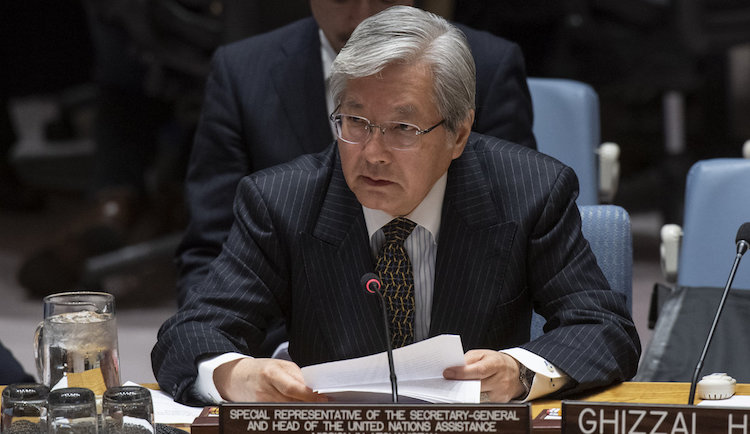By J Nastranis
NEW YORK (IDN) – The possibility of a negotiated end to the conflict in Afghanistan has never been more real in the past 17 years than it is now, according to the United Nations top envoy in Afghanistan.
Tadamichi Yamamoto told the Security Council on December 17 he is encouraged by several recent developments, including the appointment of a team to negotiate with the Taliban, the announcement of a peace advisory board representing a broad set of Afghan politicians and recent initiatives by key international partners.
On the Afghan side, he added, a peace plan was presented by President Ghani and Chief Executive Abdullah at the Geneva Ministerial Conference on November 27-28, co-hosted by the government of Afghanistan and the United Nations, which renewed the partnership and cooperation of the government of Afghanistan and the international community for Afghanistan’s peace, prosperity and self-reliance midway through the Transformation Decade (2015-2024).
A team to negotiate directly with the Taliban was appointed. A senior advisory board representing a broader set of Afghan politicians to support the peace efforts was also announced. On December 9, a new head of the Secretariat of the High Peace Council was appointed.
Yamamoto said in Geneva, there was a dedicated meeting on peace where participants reiterated that all international efforts, including those by regional actors and neighbours, need to be in concert and aligned with the Afghan-led and Afghan-owned peace efforts.
“The reiteration of this key consensus is timely and important as a number of initiatives are underway to advance the process,” the UN envoy emphasised. For instance, the United States Special Envoy for peace has been conducting active engagements with various parties concerned; and a meeting was held in Moscow on November 9, where parties from the region participated to discuss peace.
Many countries in the region, including the neighbours, have also expressed their support for the peace process which appears to be emerging, Yamamoto said. “The key next step would be for representatives of the Government and the Taliban to meet, or at least to formally initiate what in mediation is referred to as talks about talks,” said the UN envoy, underlining the real possibility of a negotiated end to the conflict.
Yamamoto, the Secretary-General’s Special Representative for Afghanistan, said that with a shift to talks, it would be possible to begin to envisage the benefits of a stable Afghanistan, but cautioned that when adversaries begin to engage with each other, it is also a moment of risk.
“For the sake of a peaceful future of Afghanistan, these opportunities must be fulfilled, and the risks managed,” he stressed, noting that actions on the battlefield can impact progress in any peace process and urging all parties to the conflict to consider carefully how they can reduce the levels of violence.
Yamamoto, who is also head of the UN Assistance Mission in Afghanistan (UNAMA), expressed hope that the current momentum will bring parties together so that they can begin to explore how they would address the multitude of agenda points needed for arriving at a peaceful settlement.
“I call upon the countries in the region, in particular, to contribute to creating an environment conducive to peace talks, allowing the people of Afghanistan to resolve their internal differences through negotiations,” said the UN envoy. “All international efforts, including those by regional actors and neighbours, need to be in concert and aligned with the Afghan-led and Afghan-owned peace efforts.”
In his briefing to the Security Council on December 17, Yamamoto touched on several other pressing issues, including the parliamentary and presidential elections, the continuing high numbers of civilian casualties, and the need to implement anti-corruption reform in the interest of economic development.
In closing, the UN envoy drew attention to the ongoing suffering that plagues a large proportion of citizens in Afghanistan. “Despite progress on economic reforms, the country remains one of the world’s poorest, and it is blighted by climate change,” he said.
“Of most immediate concern are people struck by drought and violence, and the suffering of 4.5 million people needs to be alleviated. The United Nations and its partners are issuing the Humanitarian Response Plan for Afghanistan. Around 612 million U.S. dollars is required for 2019, and I ask the international community for their immediate financial support to help people in need across Afghanistan,” Yamamoto concluded. [IDN-InDepthNews – 17 December 2018]
Photo: Tadamichi Yamamoto, UN Secretary-General’s Special Representative for Afghanistan, briefing the Security Council. Credit: unama.unmissions.org
IDN is flagship agency of the International Press Syndicate.
facebook.com/IDN.GoingDeeper – twitter.com/InDepthNews
Send your comment: comment@indepthnews.colo.ba.be
Subscribe to IDN Newsletter: newsletter@indepthnews.colo.ba.be

